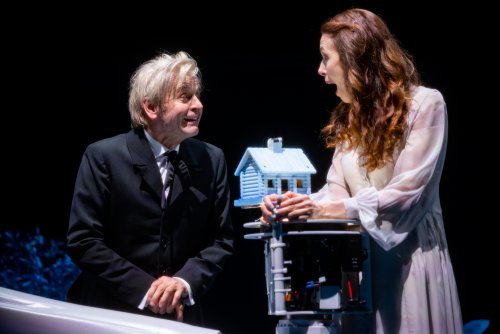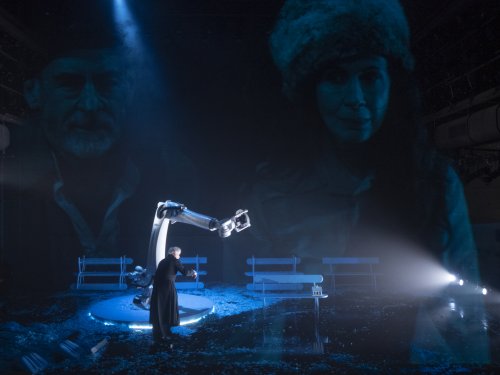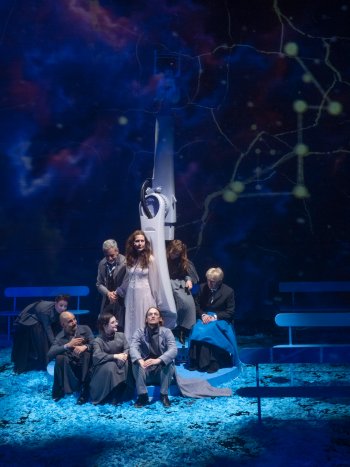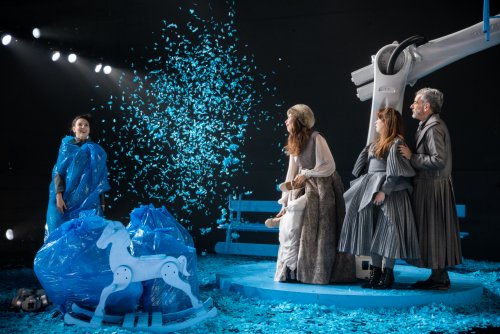The Orchard
A perplexing high-tech adaptation of Chekhov's "The Cherry Orchard" with a cast headed by Mikhail Baryshnikov, Jessica Hecht and Mark Nelson.

Mikhail Baryshnikov and Jessica Hecht in a scene from “The Orchard” at the Baryshnikov Arts Center (Photo credit: Maria Baranova)
[avatar user=”Victor Gluck” size=”96″ align=”left”] Victor Gluck, Editor-in-Chief[/avatar]
[Note; This is a return engagement in Boston of the production which previous played New York’s Baryshnikov Arts Center with all but two of the same actors.}
Director projects are only useful if they enhance the meaning of the play. When they are antithetical to the author’s intentions or obscure the play’s essence, they are entirely pointless. Then they become a showcase for the director and not a very good advertisement for his or her talents.
Such an event is the high-tech adaptation at the Baryshnikov Arts Center calling itself The Orchard, conceived and directed by Igor Golyak, and described as based on The Cherry Orchard by Anton Chekhov as translated by Carol Rocamora. If you don’t know the play, you will be entirely at sea. If you know the play, you will marvel at all the totally unnecessary tricks used by the director that do nothing to help with understanding the play or ferreting out its meaning. Although the production has a fine cast headed by Mikhail Baryshnikov and Jessica Hecht, the actors are swamped by all the unnecessary trappings around them.
In Anna Fedorova’s scenic design, the stage is separated from the audience by a scrim which is used for slide projections, images and words such as stage directions. At times, video of the actors on stage are all projected blown up to the full size of the stage; other times the video is projected on a scrim on the back wall of the stage. This distracts from focusing on the performance on stage. Although the play is called The Cherry Orchard and cherry blossoms are pink, the stage is littered at all times with blue petals and usually bathed in blue lights (in Yuki Nakase Link’s lighting design.) There is no explanation for blue rather than pink. The only scenery is eight blue benches which are rearranged for the play’s four scenes, to suggest a nursery (with a rocking horse and blue teddy bear), a garden and a drawing room.

Mark Nelson and Jessica Hecht (above) and Mikhail Baryshnikov (below) in a scene from “The Orchard” at the Baryshnikov Arts Center (Photo credit: Pavel Antonov)
Dominating the stage in the center rear is a 12-foot robotic arm with a light at its end which continually turns and does other tricks like delivering a tray of tea and at the end raising a bench high into the air (robotics design by Tom Sepe). It is distracting and meaningless although the actors interact with it as though it were a silent valet. At times one wonders if the video is being filmed from the armature but there is no clue either way. There is also a headless robotic dog which receives the only laugh of the evening although Chekhov considered this play a comedy.
Alex Basco Koch’s projections include the planets which spin and eventually cross the stage in the garden scene, blue petals falling, and various combinations of actors, sometimes on stage, and sometimes showing flashbacks of scenes already played. (instead of paying attention to the play one tries to name the planets as they go by which takes up a good deal of valuable time.) In Oana Botez’s costume design the actors wear combinations of gray, charcoal and black, while Hecht as the play’s heroine, Madame Lyubov Andreevna Ranevskaya wears white in two acts. Two of the men wear long coats that have been cut in half so that each wears only one side. While most of the women’s costumes seem to be period accurate in the dim lighting, others wear dresses with so many sets of pleats as to be parodies of turn-of-the-last-century gowns. At times, the drab costumes suggest ghosts or shadows but this is not dealt with to any degree.

The Company of “The Orchard” at the Baryshnikov Arts Center (Photo credit: Pavel Antonov)
Strangest of all is that the play is performed in several languages often not translated for the audience who is unlikely to know all of them: Russian, German, French, American Sign Language and American English. These may be people of the world, but this only hinders understanding for the contemporary audience. Four minor characters (three servants and a bankrupt neighboring landowner) have been eliminated and a few of their lines assigned to other characters. Also there is a tiny blue house that lights up that one assumes is meant to be a child’s toy. What any of this has to do with the play that Chekhov wrote is up for debate. It doesn’t help the play but it is all certainly distracting.
For those who are not familiar with the original set in 1904, it concerns Madame Lyubov Andreevna Ranevskaya (Hecht) whose Russian country estate is about to be auctioned off due to a default on the mortgage. She returns from Paris where she fled seven years ago after the death of both her husband and her little son Grisha. She has come to support her brother Leonid Andreevich Gaev (Mark Nelson) in the effort to save the estate, as well as see her daughter Anya (Juliet Brett) and adopted daughter Varya (Elise Kibler) who works as the housekeeper. Unfortunately, both Lyubov and Gaev, like many aristocrats, are overcome with inertia and incapable of lifting a finger to raise any money to avoid the inevitable. Even though the merchant Lopakhin (Nael Nacer) (not of their class) has a plan to sell their famed cherry orchard and mansion for summer estates which will save their finances, they cannot make a decision.
Along with the governess Charlotta Ivanovna (Darya Denisova) and Grisha’s former tutor Pyotr Trofimov (John McGinty), they go on as though they do not have only three months to get their affairs in order. The inevitable takes place with ironic results and the old order comes to an end. Chekhov’s theme is the inability of the conservative aristocracy to adapt to changing times and rise of the middle or working classes. This may no longer seem relevant today but many people even now are guilty of inertia in their daily lives and incapable of making a move.

Elise Kibler and Juliet Brett in a scene from “The Orchard” at the Baryshnikov Arts Center (Photo credit: Maria Baranova)
The scrim at the front of the stage, the distracting video, dim blue lighting and the fact that much of the action is staged at the rear of the stage make the performances of the fine cast very remote, nor can they overcome the technical encumbrances. Hecht beautifully captures Lyubov’s inability to deal with reality as well as Nelson as her equally deluded and extravagant brother. As the 87-year-old manservant Firs, the legendary Baryshnikov (now silver haired), returning to the New York stage for the first time since 2008, gets to open the play in a wind storm (a scene added by the director) and close the play in its famous last scene, but his thick Russian accent makes it difficult to comprehend what he is saying.
Brett in the ingénue role of Anya has a wide-eyed innocence while Kibler as her somewhat older adopted sister Varya has the confused air of one who is socially awkward. As the merchant who hails from the lower classes, Nacer successfully personifies a man too eager to please as well as prove that he has made it up the social ladder. However, his occasionally speaking in French seems an unnecessary affectation not in the traditional English language text. McGinty as the Tutor, called the “perennial student,” is very expressive in American Sign Language but as most of it remains untranslated for the hearing audience his role becomes negligible. Denisova is amusing as the eccentric German governess. It is a shame that director Golyak went to so much trouble to sabotage their performances with the unnecessary trappings. As the working class Passerby, Ilia Volok dressed in a gas mask speaks only in Russian, but without supertitles to help an English speaking audience. One assumes he represents the Russian Revolution on the horizon.

Darya Denisova, Jessica Hecht, Juliet Brett and Mark Nelson in a scene from “The Orchard” at the Baryshnikov Arts Center (Photo credit: Maria Baranova)
In point of fact, Golyak is the founder and producing artistic director of Arlekin Players Theater, Needham, Massachusetts, and its subsidiary Zero Gravity (zero-G) Virtual Theater Lab which specializes in virtual theater. This production appears to have started last year as the interactive streaming production of chekhovOS: an experimental game with some of the same actors. Some of this work may have made its way into the virtual on-line performance of The Orchard which begins with a 15 minute interactive prologue with Baryshnikov as Anton Chekhov giving us a tour of the BAC which is supposedly to be auctioned. (However, depending on which door you choose to enter, you will have a different experience.) The auction interrupts the action of the third act during the transmission of the live play once it begins. Unfortunately, the virtual performance has the same problems of being filmed through the scrim, with the video often blocking the actors and the darkness of the lighting, all of which is not suitable for streaming.
Experimental theater is all well and good – except when it gets in the way of the play and author. While Anton Chekhov’s pre-World War I plays may seem in need of a make-over for some, they are well-written classics which can stand on their own. This high-tech version adds nothing to either the understanding or enjoyment of The Cherry Orchard. Devoid of atmosphere, it diminishes the charms that the play offers. Don’t blame the actors who are used as unwitting pawns by their director who appears to be too interested in innovation to worry about the text.
The Orchard (November 4 – 13, 2022)
Groundswell Theatricals presents Arlekin Players Theatre | Zero Gravity (zero-G) Virtual Theater Lab’s production
Robert J. Orchard Stage, Emerson Paramount Center, 559 Washington Street, in Boston, MA 02111
For tickets, call 617-824-8400 or visit http://www.tickets@emersontheatres.org
Running time: two hours without an intermission






Leave a comment